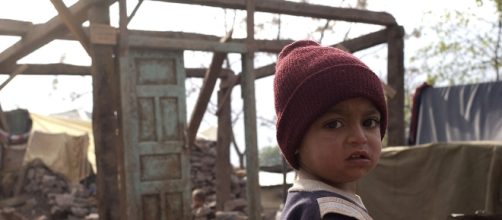Experiencing a disaster first-hand can be quite distressing for people, particularly Children. According to the United Nations, young people comprise the largest group of people affected by disasters like the recent Hurricane Harvey.
Experts who have studied how kids cope with disasters like Hurricane Katrina, or how children respond to traumatic events like the war in Serbia, noted how many youngsters emerge from these experiences just fine. For a handful of kids, though, the distress lingers on.
While many Americans have been busy rebuilding their lives in the aftermath of tropical storm Harvey, which brought out the best (epic feats of rescue) and worst (selfish acts, stealing, political bickerings and snarking on social media) in people, families tend to overlook the hardest hit on the psychological level by such calamities -- children.
Unspoken distress
Children displaced by war or reeling from tragedy need to be reassured that the world is a good place to be. After traumatic events like war, images of bad things and harm inflicted on people by certain groups are instilled in young minds.
The fact that many young kids are unable to describe the emotional distress they may be feeling -- as an offshoot of a disaster that has displaced them from their home countries or led them to witness suffering and even deaths -- compounds the situation. There are cases of children who end up with difficulty sleeping, are irritable, obsessive, encounter problems in school, or become reclusive.
Adults definitely need to deal with their own stresses and responses to the crisis.
Part and parcel of this is reaffirming relationships, especially with the younger members of their families.
Helping kids become resilient
Parents or caretakers need to pay close attention to the warning signs of children still reeling from the effects of a major disaster like Hurricane Harvey. Among the signs that children may be struggling emotionally after a disaster are a loss of appetite, constant nightmares, mood swings, and lack of interest in engaging in their favorite activities.
The scars and trauma of war and terrifying events continue even after most children have reached safety. Minors who are not guided by their elders face a greater risk of developing mental health problems.
The fact that there may be added stressors such as financial difficulties and illness may aggravate or make coping even more difficult for children after a disaster.
One way adults can help kids recover from a major disaster is by teaching coping skills like identifying their innermost feelings, and ingraining positivity as well as steps leading to problem-solving.
International organizations like UNESCO that have trained counselors suggest asking kids how exactly they feel. Children may exhibit signs of feeling fine after traumatic incidents and appear to be functioning well, but it is still best to talk things out or offer them a hand to hold.
Exposing children to too many horrific images and stories about a disaster may also re-traumatize them. Adults should monitor media and other informational channels that their kids have access to. The most crucial thing to do is to get children back into their usual routines as soon as possible. Other measures to help children feel that life is back on track are also worth trying.


